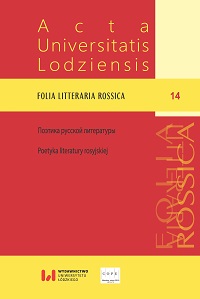“Vsyo ne tak, kak nado…”: from Vysotsky’s parody to Pyetzukh’s remake (axiologisation of Russian classic)
DOI:
https://doi.org/10.18778/1427-9681.14.19Keywords:
Vysotsky, Pyetzukh, Russian literature, classic works, parody, remakeAbstract
The idea of the literariness of Russian culture, of the impact of literature on Russian life may be an axiom of the Russian cultural consciousness, yet it does not cease to attract the attention of researchers. Russian literature itself, from the 19th century onwards, has been a manifestation of this idea, even though the semantics of the life–literature relationship evolves. The present text traces the development of the said idea in the Russian unofficial literature from the Soviet period (1960s-1980s) on the basis of comparison between Vladimir Vysotsky’s parody on Pushkin’s prologue to the poem Ruslan and Lyudmila and Vyacheslav Pyetzukh’s The New Moscow Philosophy (Novaya moskovskaya filosofiya) – a remake of Dostoevsky’s Crime and Punishment. A question is posed about the difference between Vysotsky’s parody and school parodies (a connection which the bard’s researchers also investigate) and the elements of remake within it. The analysis thus leads to the theoretical problem of the relationship between parody and remake. What calls for attention in Pyetzukh’s novella is the metatextual commentary on the role and value of the Russian classics (and literature in general), and on the literariness of the Russian consciousness – a commentary which becomes close to scientific discourse. The affinity of Pyetzukh’s concept with that of Vysotsky can also be found in the travestied image of the Soviet reality as seen in the mirror of a classic work, and in the direct expression of the notion of devaluation: the “not as with other people” formula in Pyetzukh, and the one “things are not as they ought to be” in Vysotsky. The conclusion points to the development of a similar axiologisation of the Russian classics observable in the post-modern remakes from the 1990s to this day.
Downloads
References
Arpenteva, Miriyam R. “Remeyk kak syuzhetnaya rekonstruktsiya”. Syuzhetologiya i syuzhetografiya. No. 2 (2016): 9–17.
Google Scholar
Bakhtin, Vladimir S. “‘U Lukomorya dub srubili…’: Malenkaya shkolnaya Pushkiniana”. Neva. No. 1 (1993): 275–277.
Google Scholar
Berenshteyn, Efim P. ‘Komu skazat spasibo…’ – ‘…ved est, naverno’: mir bez Boga v poezii Vladimira Vysotskogo. In: Proizvodstvo smysla: sbornik statei i materialov pamyati I. V. Fomenko, ed. S. Yu. Artemova, N. A. Veselova, A. G. Stepanov. Tver: Tverskoi gosudarstvennyi universitet, 2018: 505–518.
Google Scholar
Bogdanova, Olga V. Ironichnaya i literaturotsentrichnaya proza Vyacheslava Petsukha. In: Postmodernizm v kontekste sovremennoi literatury (60-e – 90-e gody ХХ – nachalo XXI v.). Sankt-Peterburg: Filologicheskii fakultet SPbGU, 2004: 182–224.
Google Scholar
Brodskii, Iosif B. Menshe edinitsy. In: Sochineniya Iosifa Brodskogo: v 7 t. Vol. 5, ed. Ya. A. Gordina. Sankt-Peterburg: Pushkinskii fond, 2001: 7–27.
Google Scholar
Burovtseva, Nataliya Yu. “‘Russkoe varene’ po retseptu doktora Chekhova (Dialog s klassikom v pese L. Ulitskoi)”. Yaroslavskii pedagogicheskii vestnik. No. 2 (2010): 142–147.
Google Scholar
Chavdarova, Dechka. Homo legens v russkoi literature ХIХ veka. Shumen: Aksios, 1997.
Google Scholar
Dobrenko, Evgenii A. Formovka sovetskogo chitatelya: sotsialnye i esteticheskie predposylki retseptsii sovetskoi literatury. Sankt-Peterburg: Akademicheskii proekt, 1997.
Google Scholar
Erofeev, Venedikt V. Valpurgieva noch, ili Shagi Komandora. In: Zapiski psikhopata. Moskva: Vagrius, 2000: 267–344.
Google Scholar
Esaulov, Ivan A. Literatura kak uchebnik zhizni. In: Sotsrealisticheskii kanon: sbornik statei, ed. Kh. Gyunter i E. Dobrenko. Sankt-Peterburg: Akademicheskii proekt, 2000: 596–598.
Google Scholar
Evtimova, Rumyana. Klasitsite v postmoderna situatsiya. In: Retseptsii i refleksii (Ruska literatura ХХ vek). Sofiya: Universitetsko izdatelstvo Sv. Kliment Okhridski, 2019.
Google Scholar
Kenko, Ariadna A. “O literaturotsentrizme tvorchestva V. Petsukha”. Problemy istorii, filosofii, kultury. No. 3 (2012): 211–217.
Google Scholar
Kondakov, Igor V. “Po tu storonu slova. Krizis literaturotsentrizma v Rossii ХХ–ХХI vekov”. Voprosy literatury. No. 5 (2008): 5–44.
Google Scholar
Korobkova, Tatyana V. “Ierarkhiya tsennostei v proze i publitsistike V. A. Petsukha”. Mir nauki, kultury, obrazovaniya. No. 3 (2019): 372–373.
Google Scholar
Kulagin, Anatolii V. Poeziya Vysotskogo: tvorcheskaya evolyutsiya. Voronezh: Ekho, 2013.
Google Scholar
Lipovetskii, Mark N. Russkii postmodernizm: ocherki istoricheskoi poetiki. Ekaterinburg: Uralskii gosudarstvennyi pedagogicheskii universitet, 1997.
Google Scholar
Lure, Mikhail L. Parodiynaya poeziya shkolnikov. In: Russkii shkolnyi folklor: Ot ‘vyzyvaniy’ Pikovoy damy do semeynykh rasskazov, ed. A. F. Belousov. Moskva: Ladomir, 1998: 430–441.
Google Scholar
Petsukh, Vyacheslav A. “Novaya moskovskaya filosofiya”. Novyi mir. No. 1 (1989): 54–124.
Google Scholar
Protokhristova, Kleo. Literaturniyat dvayseti vek. Sinkhronni srezove i diakhronni proektsii. Plovdiv: Universitetsko izdatelstvo Paisiy Khilendarski, 2020.
Google Scholar
Segal, Dmitrii M. Literatura kak okhrannaya gramota. Moskva: Vodolei Publishers, 2006.
Google Scholar
Segal, Dmitrii M. “Literatura kak okhrannaya gramota”. Slavica Hierosolymitana: Slavic Studies of the Hebrew University. No. 5/6 (1981): 151–244.
Google Scholar
Segal, Dmitrii M. “Literatura kak vtorichnaya modeliruyushchaya sistema”. Slavica Hierosolymitana: Slavic Studies of the Hebrew University. No. 4 (1979): 1–35.
Google Scholar
Vysotskii, Vladimir S. ‘Byvalo, Pushkina chital…’. In: Sobranie sochinenii: v 4 t. Vol. 3, ed. O. Novikova, Vl. Novikov. Moskva: Vremya, 2011: 37–38.
Google Scholar
Vysotskii, Vladimir S. Lukomorya bolshe net (Antiskazka). In: Sobranie sochinenii: v 4 t. Vol. 1, ed. O. Novikova, Vl. Novikov. Moskva: Vremya, 2011: 187–191.
Google Scholar
Zagidullina, Marina V. “Remeyki, ili Ekspansiya klassiki”. Novoe literaturnoe obozrenie. No. 5(69) (2004): 213–222.
Google Scholar












